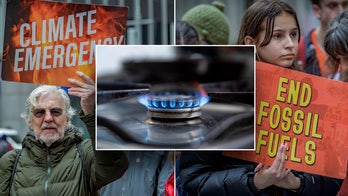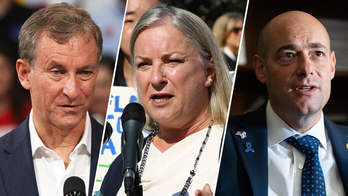A new regulation announced Friday by the Obama administration -- requiring fracking companies who drill on federal lands to disclose what chemicals they use in the controversial process -- was blasted as "yet another attack on American jobs" by GOP lawmakers, who said the mandate could slow the U.S. energy boom.
The Bureau of Land Management rule, which would take effect in June, also updates requirements for well construction and disposal of water and other fluids used in hydraulic fracturing, a drilling method that has spurred jobs and economic growth in natural gas and oil production. It would not apply to privately owned lands, but roughly 10 percent of the U.S. energy sector's work takes place on land leased from the federal government. Much more federally-owned acreage could potentially be fracked for oil and gas, if made available for lease, claim energy company advocates.
“Today’s proposed federal regulations on hydraulic fracturing represent yet another attack on American jobs by President Obama, and continue his attack on American-made energy,” said Rep. Steve Scalise, R-La. "Considering that states already successfully regulate fracking, the last thing the American people need is the heavy hand of the federal government killing good jobs and stifling American energy production with more of their radical regulations.”
“Today’s proposed federal regulations on hydraulic fracturing represent yet another attack on American jobs by President Obama, and continue his attack on American-made energy.”
The rule has been under consideration for more than three years, drawing criticism from the oil and gas industry and environmental groups. The industry fears the regulation could hinder the drilling boom, while some environmental groups worry that it could allow unsafe drilling techniques to pollute groundwater.
The final rule closely tracks a draft first proposed by the Obama administration in 2013. The rule relies on an online database used by at least 16 states to track the chemicals used in fracking operations. The website, FracFocus.org, was formed by industry and intergovernmental groups in 2011 and allows users to gather well-specific data on tens of thousands of drilling sites across the country.
Companies will have to disclose the chemicals they use within 30 days of the fracking operation.
Interior Secretary Sally Jewell said the rule will allow for continued responsible development of federal oil and gas resources on millions of acres of public lands while assuring the public that "transparent and effective safety and environmental protections are in place."
Jewell, who worked on fracking operations in Oklahoma long before joining the government in 2013, said decades-old federal regulations have failed to keep pace with modern technological advances.
"I've personally fracked wells, so I understand the risk as well as the reward," Jewell said. "We owe it to our kids to get this right."
Fracking involves pumping huge volumes of water, sand and chemicals underground to split open rocks to allow oil and gas to flow. Improved technology has allowed energy companies to gain access to huge stores of natural gas underneath states from Wyoming to New York but has also raised widespread concerns about alleged groundwater contamination and even earthquakes.
Brian Deese, a senior adviser to President Obama, said the rules for public lands could serve as a template that the oil and gas industry could adopt to help address the public's concern about the health and safety of fracking.
"Ultimately, this is an issue that is going to be decided in state capitals and localities as well as with the industry," he said.
The Interior Department estimated the cost of complying with the rule would be less than one-fourth of 1 percent of the cost to drill a well.
But critics say anything the complicates, or adds to the cost of extracting gas and oil hurts America's economic competitiveness. U.S. Sen. Lisa Murkowski, R-Alaska, said the federal government should follow laws regulating private land, not the other way around.
“The energy renaissance is largely a story about state and private land, but vast resources remain inaccessible and untapped in federal areas, particularly in the West,” Murkowski said. “This administration has already taken unprecedented steps to block development in Alaska. Given its anti-development approach, we should expect this rule to make it even harder to produce oil and gas on federal lands. The fact remains: if Interior was half as interested in new production as it is in new regulation, our nation would be in a far better place.”
Advocates say hydraulic fracturing and directional drilling have triggered an unprecedented upswing in domestic oil and natural gas production over the past six years, with oil production more than doubling to 9 million barrels a day. They also say fracking is a safe and proven method.
"The Obama administration's hydraulic fracturing rule is a solution in search of a problem," said Thomas Pyle, president of the pro-industry Institute for Energy Research.
The rule will make the Interior Department's Bureau of Land Management the largest customer of FracFocus, a website that has taken on increasing prominence in recent years as it collects data on drilling sites. Nearly 95,000 wells nationwide are registered with FracFocus, which is managed by the Ground Water Protection Council and Interstate Oil and Gas Compact Commission. Both groups are based in Oklahoma. The groundwater council is a nonprofit organization while the oil and gas commission is a collection of state officials from energy-producing states.
Jewell said that BLM will have representation on FracFocus' board, adding that the group has taken steps to improve its platform, including adopting a new format that allows data to be automatically read by computers.
The Associated Press contributed to this report.




